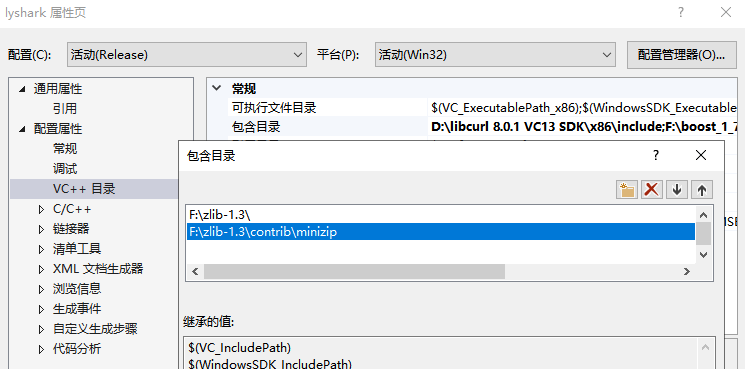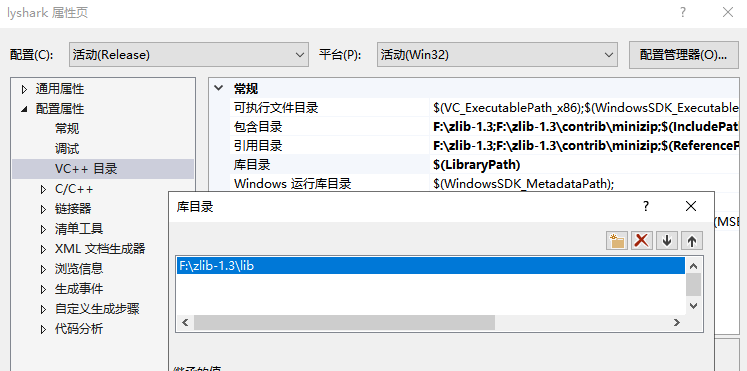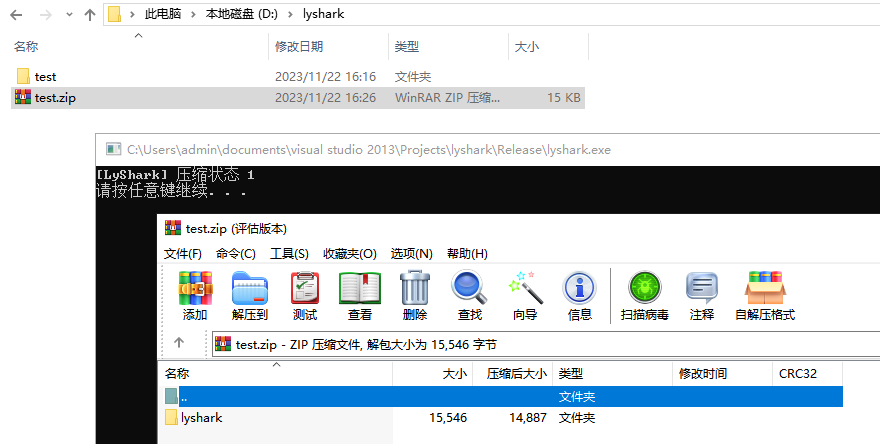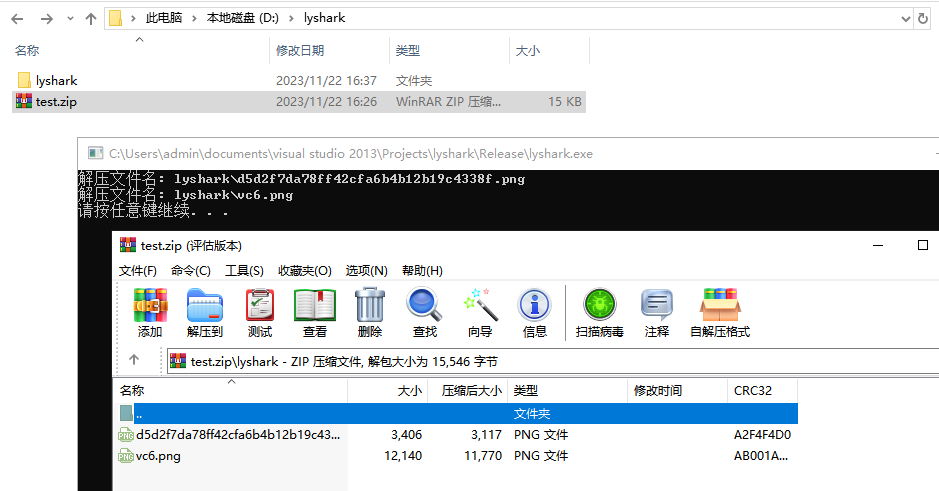C++ MiniZip实现目录压缩与解压
Zlib是一个开源的数据压缩库,提供了一种通用的数据压缩和解压缩算法。它最初由Jean-Loup Gailly和Mark Adler开发,旨在成为一个高效、轻量级的压缩库,其被广泛应用于许多领域,包括网络通信、文件压缩、数据库系统等。其压缩算法是基于DEFLATE算法,这是一种无损数据压缩算法,通常能够提供相当高的压缩比。
在Zlib项目中的contrib目录下有一个minizip子项目,minizip实际上不是zlib库的一部分,而是一个独立的开源库,用于处理ZIP压缩文件格式。它提供了对ZIP文件的创建和解压的简单接口。minizip在很多情况下与zlib一起使用,因为ZIP压缩通常使用了DEFLATE压缩算法。通过对minizip库的二次封装则可实现针对目录的压缩与解压功能。

如果你想使用minizip通常你需要下载并编译它,然后将其链接到你的项目中。
编译Zlib库很简单,解压文件并进入到\zlib-1.3\contrib\vstudio目录下,根据自己编译器版本选择不同的目录,这里我选择vc12,进入后打开zlibvc.sln等待生成即可。

成功后可获得两个文件分别是zlibstat.lib和zlibwapi.lib如下图;

接着配置引用目录,这里需要多配置一个minizip头文件,该头文件是zlib里面的一个子项目。

lib库则需要包含zlibstat.lib和zlibwapi.lib这两个文件,此处读者可以自行放入到一个目录下;

ZIP 递归压缩目录
如下所示代码是一个使用zlib库实现的简单文件夹压缩工具的C++程序。该程序提供了压缩文件夹到 ZIP 文件的功能,支持递归地添加文件和子文件夹,利用了 Windows API 和 zlib 库的函数。
#define ZLIB_WINAPI
#include <string>
#include <iostream>
#include <vector>
#include <Shlwapi.h>
#include <zip.h>
#include <unzip.h>
#include <zlib.h>
using namespace std;
#pragma comment(lib, "Shlwapi.lib")
#pragma comment(lib, "zlibstat.lib")
bool nyAddfiletoZip(zipFile zfile, const std::string& fileNameinZip, const std::string& srcfile)
{
// 目录如果为空则直接返回
if (NULL == zfile || fileNameinZip.empty())
{
return 0;
}
int nErr = 0;
zip_fileinfo zinfo = { 0 };
tm_zip tmz = { 0 };
zinfo.tmz_date = tmz;
zinfo.dosDate = 0;
zinfo.internal_fa = 0;
zinfo.external_fa = 0;
char sznewfileName[MAX_PATH] = { 0 };
memset(sznewfileName, 0x00, sizeof(sznewfileName));
strcat_s(sznewfileName, fileNameinZip.c_str());
if (srcfile.empty())
{
strcat_s(sznewfileName, "\\");
}
nErr = zipOpenNewFileInZip(zfile, sznewfileName, &zinfo, NULL, 0, NULL, 0, NULL, Z_DEFLATED, Z_DEFAULT_COMPRESSION);
if (nErr != ZIP_OK)
{
return false;
}
if (!srcfile.empty())
{
// 打开源文件
FILE* srcfp = _fsopen(srcfile.c_str(), "rb", _SH_DENYNO);
if (NULL == srcfp)
{
std::cout << "打开源文件失败" << std::endl;
return false;
}
// 读入源文件写入zip文件
int numBytes = 0;
char* pBuf = new char[1024 * 100];
if (NULL == pBuf)
{
std::cout << "新建缓冲区失败" << std::endl;
return 0;
}
while (!feof(srcfp))
{
memset(pBuf, 0x00, sizeof(pBuf));
numBytes = fread(pBuf, 1, sizeof(pBuf), srcfp);
nErr = zipWriteInFileInZip(zfile, pBuf, numBytes);
if (ferror(srcfp))
{
break;
}
}
delete[] pBuf;
fclose(srcfp);
}
zipCloseFileInZip(zfile);
return true;
}
bool nyCollectfileInDirtoZip(zipFile zfile, const std::string& filepath, const std::string& parentdirName)
{
if (NULL == zfile || filepath.empty())
{
return false;
}
bool bFile = false;
std::string relativepath = "";
WIN32_FIND_DATAA findFileData;
char szpath[MAX_PATH] = { 0 };
if (::PathIsDirectoryA(filepath.c_str()))
{
strcpy_s(szpath, sizeof(szpath) / sizeof(szpath[0]), filepath.c_str());
int len = strlen(szpath) + strlen("\\*.*") + 1;
strcat_s(szpath, len, "\\*.*");
}
else
{
bFile = true;
strcpy_s(szpath, sizeof(szpath) / sizeof(szpath[0]), filepath.c_str());
}
HANDLE hFile = ::FindFirstFileA(szpath, &findFileData);
if (NULL == hFile)
{
return false;
}
do
{
if (parentdirName.empty())
relativepath = findFileData.cFileName;
else
// 生成zip文件中的相对路径
relativepath = parentdirName + "\\" + findFileData.cFileName;
// 如果是目录
if (findFileData.dwFileAttributes == FILE_ATTRIBUTE_DIRECTORY)
{
// 去掉目录中的.当前目录和..前一个目录
if (strcmp(findFileData.cFileName, ".") != 0 && strcmp(findFileData.cFileName, "..") != 0)
{
nyAddfiletoZip(zfile, relativepath, "");
char szTemp[MAX_PATH] = { 0 };
strcpy_s(szTemp, filepath.c_str());
strcat_s(szTemp, "\\");
strcat_s(szTemp, findFileData.cFileName);
nyCollectfileInDirtoZip(zfile, szTemp, relativepath);
}
continue;
}
char szTemp[MAX_PATH] = { 0 };
if (bFile)
{
//注意:处理单独文件的压缩
strcpy_s(szTemp, filepath.c_str());
}
else
{
//注意:处理目录文件的压缩
strcpy_s(szTemp, filepath.c_str());
strcat_s(szTemp, "\\");
strcat_s(szTemp, findFileData.cFileName);
}
nyAddfiletoZip(zfile, relativepath, szTemp);
} while (::FindNextFileA(hFile, &findFileData));
FindClose(hFile);
return true;
}
/*
* 函数功能 : 压缩文件夹到目录
* 备 注 : dirpathName 源文件/文件夹
* zipFileName 目的压缩包
* parentdirName 压缩包内名字(文件夹名)
*/
bool nyCreateZipfromDir(const std::string& dirpathName, const std::string& zipfileName, const std::string& parentdirName)
{
bool bRet = false;
/*
APPEND_STATUS_CREATE 创建追加
APPEND_STATUS_CREATEAFTER 创建后追加(覆盖方式)
APPEND_STATUS_ADDINZIP 直接追加
*/
zipFile zFile = NULL;
if (!::PathFileExistsA(zipfileName.c_str()))
{
zFile = zipOpen(zipfileName.c_str(), APPEND_STATUS_CREATE);
}
else
{
zFile = zipOpen(zipfileName.c_str(), APPEND_STATUS_ADDINZIP);
}
if (NULL == zFile)
{
std::cout << "创建ZIP文件失败" << std::endl;
return bRet;
}
if (nyCollectfileInDirtoZip(zFile, dirpathName, parentdirName))
{
bRet = true;
}
zipClose(zFile, NULL);
return bRet;
}
主要功能
nyCreateZipfromDir函数
bool nyCreateZipfromDir(const std::string& dirpathName, const std::string& zipfileName, const std::string& parentdirName);
功能:压缩文件夹到指定的 ZIP 文件。
参数:
- dirpathName:源文件夹路径。
- zipfileName:目标 ZIP 文件路径。
- parentdirName:在 ZIP 文件内的文件夹名(如果为空则不指定目录)。
nyCollectfileInDirtoZip 函数
bool nyCollectfileInDirtoZip(zipFile zfile, const std::string& filepath, const std::string& parentdirName);
功能:递归地收集文件夹中的文件,并将它们添加到已打开的 ZIP 文件中。
参数:
- zfile:已打开的 ZIP 文件。
- filepath:文件夹路径。
- parentdirName:在 ZIP 文件内的相对文件夹名。
nyAddfiletoZip 函数
bool nyAddfiletoZip(zipFile zfile, const std::string& fileNameinZip, const std::string& srcfile);
功能:将指定文件添加到已打开的 ZIP 文件中。
参数:
- zfile:已打开的 ZIP 文件。
- fileNameinZip:在 ZIP 文件内的相对文件路径。
- srcfile:源文件路径。
程序流程
- 文件夹压缩参数设置: 用户提供源文件夹路径、目标 ZIP 文件路径,以及在 ZIP 文件内的文件夹名。
- ZIP 文件打开: 根据目标 ZIP 文件是否存在,使用 zipOpen 函数打开 ZIP 文件。
- 文件夹递归添加: 使用 nyCollectfileInDirtoZip 函数递归地收集文件夹中的文件,并通过 nyAddfiletoZip 函数将它们添加到 ZIP 文件中。
- ZIP 文件关闭: 使用 zipClose 函数关闭 ZIP 文件。
示例用法
int main(int argc, char* argv[])
{
std::string dirpath = "D:\\lyshark\\test"; // 源文件/文件夹
std::string zipfileName = "D:\\lyshark\\test.zip"; // 目的压缩包
bool ref = nyCreateZipfromDir(dirpath, zipfileName, "lyshark"); // 包内文件名<如果为空则压缩时不指定目录>
std::cout << "[LyShark] 压缩状态 " << ref << std::endl;
system("pause");
return 0;
}
上述调用代码,参数1指定为需要压缩的文件目录,参数2指定为需要压缩成目录名,参数3为压缩后该目录的名字。

ZIP 递归解压目录
在这个C++程序中,实现了递归解压缩ZIP文件的功能。程序提供了以下主要功能:
- replace_all 函数: 用于替换字符串中的指定子串。
- CreatedMultipleDirectory 函数: 用于创建多级目录,确保解压缩时的目录结构存在。
- UnzipFile 函数: 用于递归解压缩 ZIP 文件。该函数打开 ZIP 文件,获取文件信息,然后逐个解析和处理 ZIP 文件中的文件或目录。
#define ZLIB_WINAPI
#include <string>
#include <iostream>
#include <vector>
#include <Shlwapi.h>
#include <zip.h>
#include <unzip.h>
#include <zlib.h>
using namespace std;
#pragma comment(lib, "Shlwapi.lib")
#pragma comment(lib, "zlibstat.lib")
// 将字符串内的old_value替换成new_value
std::string& replace_all(std::string& str, const std::string& old_value, const std::string& new_value)
{
while (true)
{
std::string::size_type pos(0);
if ((pos = str.find(old_value)) != std::string::npos)
str.replace(pos, old_value.length(), new_value);
else
break;
}
return str;
}
// 创建多级目录
BOOL CreatedMultipleDirectory(const std::string& direct)
{
std::string Directoryname = direct;
if (Directoryname[Directoryname.length() - 1] != '\\')
{
Directoryname.append(1, '\\');
}
std::vector< std::string> vpath;
std::string strtemp;
BOOL bSuccess = FALSE;
for (int i = 0; i < Directoryname.length(); i++)
{
if (Directoryname[i] != '\\')
{
strtemp.append(1, Directoryname[i]);
}
else
{
vpath.push_back(strtemp);
strtemp.append(1, '\\');
}
}
std::vector< std::string>::iterator vIter = vpath.begin();
for (; vIter != vpath.end(); vIter++)
{
bSuccess = CreateDirectoryA(vIter->c_str(), NULL) ? TRUE : FALSE;
}
return bSuccess;
}
/*
* 函数功能 : 递归解压文件目录
* 备 注 : strFilePath 压缩包路径
* strTempPath 解压到
*/
void UnzipFile(const std::string& strFilePath, const std::string& strTempPath)
{
int nReturnValue;
string tempFilePath;
string srcFilePath(strFilePath);
string destFilePath;
// 打开zip文件
unzFile unzfile = unzOpen(srcFilePath.c_str());
if (unzfile == NULL)
{
return;
}
// 获取zip文件的信息
unz_global_info* pGlobalInfo = new unz_global_info;
nReturnValue = unzGetGlobalInfo(unzfile, pGlobalInfo);
if (nReturnValue != UNZ_OK)
{
std::cout << "数据包: " << pGlobalInfo->number_entry << endl;
return;
}
// 解析zip文件
unz_file_info* pFileInfo = new unz_file_info;
char szZipFName[MAX_PATH] = { 0 };
char szExtraName[MAX_PATH] = { 0 };
char szCommName[MAX_PATH] = { 0 };
// 存放从zip中解析出来的内部文件名
for (int i = 0; i < pGlobalInfo->number_entry; i++)
{
// 解析得到zip中的文件信息
nReturnValue = unzGetCurrentFileInfo(unzfile, pFileInfo, szZipFName, MAX_PATH, szExtraName, MAX_PATH, szCommName, MAX_PATH);
if (nReturnValue != UNZ_OK)
return;
std::cout << "解压文件名: " << szZipFName << endl;
string strZipFName = szZipFName;
// 如果是目录则执行创建递归目录名
if (pFileInfo->external_fa == FILE_ATTRIBUTE_DIRECTORY || (strZipFName.rfind('/') == strZipFName.length() - 1))
{
destFilePath = strTempPath + "//" + szZipFName;
CreateDirectoryA(destFilePath.c_str(), NULL);
}
// 如果是文件则解压缩并创建
else
{
// 创建文件 保存完整路径
string strFullFilePath;
tempFilePath = strTempPath + "/" + szZipFName;
strFullFilePath = tempFilePath;
int nPos = tempFilePath.rfind("/");
int nPosRev = tempFilePath.rfind("\\");
if (nPosRev == string::npos && nPos == string::npos)
continue;
size_t nSplitPos = nPos > nPosRev ? nPos : nPosRev;
destFilePath = tempFilePath.substr(0, nSplitPos + 1);
if (!PathIsDirectoryA(destFilePath.c_str()))
{
// 将路径格式统一
destFilePath = replace_all(destFilePath, "/", "\\");
// 创建多级目录
int bRet = CreatedMultipleDirectory(destFilePath);
}
strFullFilePath = replace_all(strFullFilePath, "/", "\\");
HANDLE hFile = CreateFileA(strFullFilePath.c_str(), GENERIC_WRITE, 0, NULL, OPEN_ALWAYS, FILE_FLAG_WRITE_THROUGH, NULL);
if (hFile == INVALID_HANDLE_VALUE)
{
return;
}
// 打开文件
nReturnValue = unzOpenCurrentFile(unzfile);
if (nReturnValue != UNZ_OK)
{
CloseHandle(hFile);
return;
}
// 读取文件
uLong BUFFER_SIZE = pFileInfo->uncompressed_size;;
void* szReadBuffer = NULL;
szReadBuffer = (char*)malloc(BUFFER_SIZE);
if (NULL == szReadBuffer)
{
break;
}
while (TRUE)
{
memset(szReadBuffer, 0, BUFFER_SIZE);
int nReadFileSize = 0;
nReadFileSize = unzReadCurrentFile(unzfile, szReadBuffer, BUFFER_SIZE);
// 读取文件失败
if (nReadFileSize < 0)
{
unzCloseCurrentFile(unzfile);
CloseHandle(hFile);
return;
}
// 读取文件完毕
else if (nReadFileSize == 0)
{
unzCloseCurrentFile(unzfile);
CloseHandle(hFile);
break;
}
// 写入读取的内容
else
{
DWORD dWrite = 0;
BOOL bWriteSuccessed = WriteFile(hFile, szReadBuffer, BUFFER_SIZE, &dWrite, NULL);
if (!bWriteSuccessed)
{
unzCloseCurrentFile(unzfile);
CloseHandle(hFile);
return;
}
}
}
free(szReadBuffer);
}
unzGoToNextFile(unzfile);
}
delete pFileInfo;
delete pGlobalInfo;
// 关闭
if (unzfile)
{
unzClose(unzfile);
}
}
主要功能
replace_all 函数
std::string& replace_all(std::string& str, const std::string& old_value, const std::string& new_value)
功能:在字符串 str 中替换所有的 old_value 为 new_value。
参数:
- str:待处理的字符串。
- old_value:要被替换的子串。
- new_value:替换后的新子串。
返回值:替换后的字符串。
CreatedMultipleDirectory 函数
BOOL CreatedMultipleDirectory(const std::string& direct)
功能:创建多级目录,确保路径存在。
参数:
- direct:目录路径。
- 返回值:如果成功创建目录返回 TRUE,否则返回 FALSE。
UnzipFile 函数
void UnzipFile(const std::string& strFilePath, const std::string& strTempPath)
功能:递归解压缩 ZIP 文件。
参数:
- strFilePath:ZIP 文件路径。
- strTempPath:解压到的目标路径。
该函数打开 ZIP 文件,获取文件信息,然后逐个解析和处理 ZIP 文件中的文件或目录。在解析过程中,根据文件或目录的属性,创建相应的目录结构,然后将文件写入目标路径。
示例用法
int main(int argc, char* argv[])
{
std::string srcFilePath = "D:\\lyshark\\test.zip";
std::string tempdir = "D:\\lyshark\\test";
// 如果传入目录不存在则创建
if (!::PathFileExistsA(tempdir.c_str()))
{
CreatedMultipleDirectory(tempdir);
}
// 调用解压函数
UnzipFile(srcFilePath, tempdir);
system("pause");
return 0;
}
案例中,首先在解压缩之前判断传入目录是否存在,如果不存在则需要调用API创建目录,如果存在则直接调用UnzipFIle解压缩函数,实现解包,输出效果图如下;

C++ MiniZip实现目录压缩与解压的更多相关文章
- 【转】iOS开发之压缩与解压文件
ziparchive是基于开源代码”MiniZip”的zip压缩与解压的Objective-C 的Class,使用起来非常的简单方法:从http://code.google.com/p/ziparch ...
- iOS开发之压缩与解压文件
ziparchive是基于开源代码”MiniZip”的zip压缩与解压的Objective-C 的Class,使用起来非常的简单 方法:从http://code.google.com/p/ziparc ...
- 《OD学hadoop》在LINUX下如何将tar压缩文件解压到指定的目录下
linux下tar命令解压到指定的目录 :#tar zxvf /bbs.tar.zip -C /zzz/bbs //把根目录下的bbs.tar.zip解压到/zzz/bbs下,前提要保证存在/zzz/ ...
- 文件操作工具类: 文件/目录的创建、删除、移动、复制、zip压缩与解压.
FileOperationUtils.java package com.xnl.utils; import java.io.BufferedInputStream; import java.io.Bu ...
- golang zip 压缩,解压(含目录文件)
每天学习一点go src. 今天学习了zip包的简单使用,实现了含目录的压缩与解压. 写了两个方法,实现了压缩.解压. package ziptest import ( "archive/z ...
- golang tar gzip 压缩,解压(含目录文件)
tar是用于文件归档,gzip用于压缩.仅仅用tar的话,达不到压缩的目的.我们常见的tar.gz就是用gzip压缩生成的tar归档文件. go实现tar压缩与解压与zip类似,区别在于tar需要使用 ...
- C#调用RAR压缩与解压
public void RARsave(string rarPatch, string rarFiles,string patch,string rarName) { ...
- Linux压缩与解压常用命令
欢迎和大家交流技术相关问题: 邮箱: jiangxinnju@163.com 博客园地址: http://www.cnblogs.com/jiangxinnju GitHub地址: https://g ...
- Java实现文件压缩与解压
Java实现ZIP的解压与压缩功能基本都是使用了Java的多肽和递归技术,可以对单个文件和任意级联文件夹进行压缩和解压,对于一些初学者来说是个很不错的实例.(转载自http://www.puiedu. ...
- Zip 压缩、解压技术在 HTML5 浏览器中的应用
JSZip 是一款可以创建.读取.修改 .zip 文件的 javaScript 工具.在 web 应用中,免不了需要从 web 服务器中获取资源,如果可以将所有的资源都合并到一个 .zip 文件中,这 ...
随机推荐
- python: linux使用多版本python
安装python3.6 $ sudo add-apt-repository ppa:deadsnakes/ppa $ sudo apt update $ sudo apt install python ...
- VSCode:缩进两格空格
在设定中对如图所示两项进行修改: 至此问题解决.
- Mysql 统计标签出现次数(一行变多行)
需求背景 需求 一张数据表 其中有sid字段,代表tag,每行数据可能有多个tag字段 统计全量数据中所有tag出现的次数(按tag分组,分别有多少数据) source table demo id s ...
- trick : Trygub num
trick大意 我对于这个trick的理解为:支持位运算的高精度 维护一个以 \(b\)为基数的大数 \(N\),并支持以下功能: 给定(可能是负)整数 \(|x|, |y| \leqslant n\ ...
- phpexcel图片获取
phpexcel图片获取常见的两种方式: require_once dirname(__FILE__) . '/../Jn/PHPExcel.php'; $filePath = "123.x ...
- WPF 入门笔记 - 07 - MVVM示例
滴咚,大家好久不见.好就没写东西了,鸽着鸽着就无了... 回到正题,上篇文章说完命令提了一嘴MVVM模式直接就上MVVMLight这些程序的框架了,虽然也没说多少,但还是有点不好过渡,这篇对MVVM做 ...
- NOIP 2022 VP游记
总结:挂大分. HA NOIP没初中生的份,VP. CSP-S 图论专场 NOIP 数数专场. CCF 我服你. T1 看完之后,感觉不难,瞎搞了 40min+,过了大样例. 对拍不会写. T2 猜不 ...
- 以程序员的视角,介绍如何通过API接口获取淘宝商品数据的方法和步骤,并提供实际代码示例
当我们想要获取淘宝商品数据时,可以通过调用淘宝开放平台的API接口来实现.下面是一些步骤和示例代码来帮助你开始. 步骤1:申请开发者账号和应用 在开始之前,你需要在淘宝开放平台上注册一个开发者账号 ...
- 循序渐进介绍基于CommunityToolkit.Mvvm 和HandyControl的WPF应用端开发(2)
在前面随笔<循序渐进介绍基于CommunityToolkit.Mvvm 和HandyControl的WPF应用端开发(1)>中介绍了Mvvm 的开发,以及一些界面效果,本篇随笔继续深入探讨 ...
- ORACLE DBLink创建
在写测试脚本时,经常需要跨库取数据,SQL本身不支持跨库查找.Oracle提供DBLink链接,支持跨库操作. 1.创建DBLink Create public database link Next_ ...
